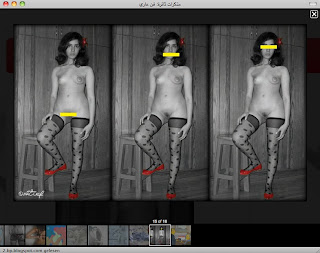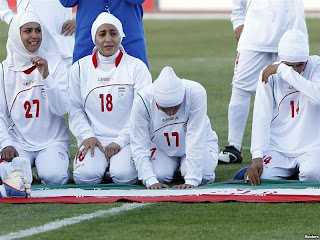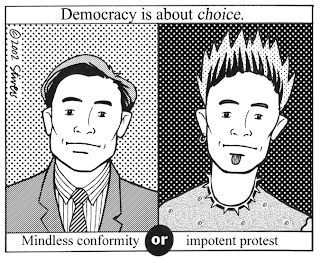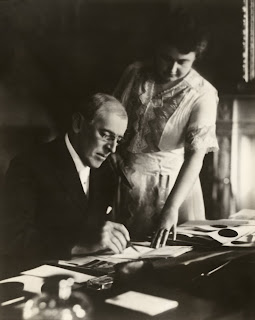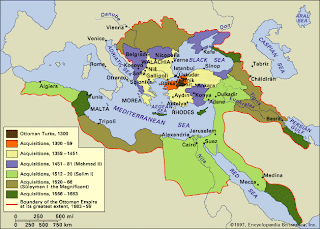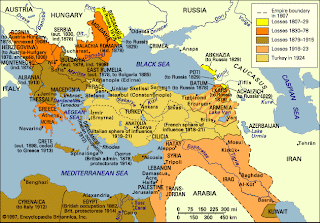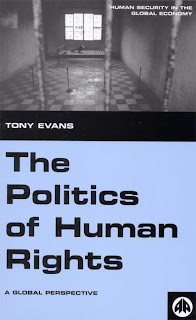>
Category Archives: human rights and democracy
>Jayshree Bajoria
>
>David Rieff
>
>International Commission on Intervention and State Sovereignty
>
- Rwanda in 1994 laid bare the full horror of inaction.
- Kosovo in 1999 raised major questions about the legitimacy of military intervention in a sovereign state.
- Bosnia in 1995 is another which has had a major impact on the contemporary policy debate about intervention for human protection purposes.
- Another was the failure and ultimate withdrawal of the UN peace operations in Somalia in 1992–93.
>Kofi Annan
>
>Aliaa Magda Elmahdy
>Trine Sejthen
>African proverb
>If you educate a boy, you educate an individual. If you educate a girl, you educate a community.
>Nujood Ali, Delphine Minoui
>My head is spinning — I’ve never seen so many people in my whole life. In the yard outside the courthouse, a crowd is bustling around in every direction: men in suits and ties with bunches of yellowed files tucked under their arms; other men wearing the zanna, the traditional ankle-length tunic of the villages of northern Yemen; and then all these women, shouting and weeping so loudly that I can’t understand a word.
I’d love to read their lips to find out what they’re saying, but the niqabs that match their long black robes hide everything except their big, round eyes. The women seem furious, as if a tornado had just destroyed their houses. I try to listen closely.
I can catch only a few words — childcare, justice, human rights — and I’m not really sure what they mean. Not far away from me is a broad- shouldered giant wearing his turban jammed down to his eyes; he’s carrying a plastic bag full of documents and telling anyone who will listen that he has come here to try to get back some land that was stolen from him. He’s dashing around like a frantic rabbit, and he almost runs right into me.
>W. R. Wilson
>Royal Canadian Mounted Police
>Human Trafficking National Coordination Centre
>
- Develop tools, protocols and guidelines to facilitate Human Trafficking investigations.
- Coordinate national awareness/training and anti-trafficking initiatives.
- Identify and maintain lines of communication, identify issues for integrated coordination and provide support
- Develop and maintain international partnerships and coordinate international initiatives.
- Coordinate intelligence and facilitate the dissemination of all sources of information/ intelligence.
>Made By Survivors Network
>
>David Batstone
>
>Human Rights Committee
>
>Debito Arudou
>… why is the government even asking whether non-Japanese deserve equal rights? Are human rights optional, a matter of opinion polls? And if a majority says foreigners deserve fewer rights, does that justify the current policy of resisting introducing laws against racial discrimination? …
… in Q3, part 2, people who felt they had experienced discrimination were to choose from a conveniently-provided list of scourges: “false rumors, bad-mouthing by neighbors,” “insults or defamation,” “bad treatment from police,” “violence, extortion,” “false accusations of crime,” “foul odors, noise pollution,” “discriminatory treatment by race, creed, gender, and social status,” “being excluded by your neighbors,” “bad treatment at work,” “your domestic utilities, such as gas or water, getting switched off,” “bad treatment at public welfare facilities,” “invasion of privacy,” “sexual harassment,” “stalking,” “something else,” and finally, “not sure, but something (nantonaku)”.
And how about “foul odors”? Under this rubric, one could argue a stinky public toilet or a humid fart in an elevator is a violation of human rights! No wonder people have trouble taking human-rights activists seriously, when concepts even utilized by the government are so ill-defined.
日本国憲法第13条
すべて国民は、個人として尊重される。生命、自由及び幸福追求に対する国民の権利については、公共の福祉に反しない限り、立法その他の国政の上で、最大の尊重を必要とする。
>伊藤真
>
>文部省
>
- みなさん、国を愛し、国に尽くすように、自分の住んでいる地方を愛し、自分の地方のために尽くしましょう。
- こんどの戦争で、天皇陛下は、大変なご苦労をなさいました。
なぜならば、古い憲法では、天皇をお助けしてくにの仕事をした人々は、国民全体が選んだ物でなかったので、国民の考えと離れて、とうとう戦争になったからです。
そこで、この先、国を治めていくについて、二度とこのようなことがないように、新しい憲法をこしらえるとき、大変苦心を致しました。 - ですから、私たちは、天皇陛下を、私たちの真ん中にしっかりとお置きして、国を治めていくについて、ご苦労のないようにしなければなりません。
- なるべくおおぜいの人の意見で、物事を決めてゆくことが、民主主義のやりかたです。
- 国民ぜんたいの意見で、国を治めてゆくのがいちばんよいのです。
- よその国との争いごとがおこったとき、けっして戦争によって、相手をまかして、じぶんのいいぶんをとおそうとしないということをきめたのです。
- みなさん、あのおそろしい戦争が、二度とおこらないように、また戦争を二度とおこさないようにいたしましょう。
>Pentti Linkola
>
>Corporate Accountability International
>Today the air we breathe, the water we drink and our very democracy are under increasing threat from corporate abuses. Corporate Accountability International is working toward a world where major decisions affecting people and the environment are based on the public interest, not on maximizing corporate profits.
>京华时报
>全国人大常委会第二十三次会议审议《中华人民共和国居民身份证法修正案(草案)》。草案要求,公民申请领取、换领、补领居民身份证,应当登记指纹信息。对于身份证为何要登记指纹信息,公安部副部长杨焕宁表示,在身份证中加入指纹信息,国家机关以及金融、电信、交通、教育、医疗等单位可以通过机读快速、准确地进行人证同一性认定,有利于提高工作效率,有效防范冒用他人居民身份证以及伪造、变更居民身份证等违法犯罪行为的发生。
>Jeff Kaufman
>
本多圭
フジテレビが俳優の松方弘樹を暴排条例に抵触しかねない危険人物として、極秘に使用禁止の通達を出したという。続いて日本テレビが、女優の水野美紀に関して、同じ理由で使用禁止の通達を流したそうだ。
松方と水野の共通点は、テレビ局にも甚大な影響力を持つ大手芸能プロ「バーニングプロダクション」から独立していることだ。
そんな2人をフジと日テレは芸能プロ関係者からの情報を鵜呑みにして、テレビ界から追放した。そこに、真実性や公平性はあるのだろうか。
「マル暴交遊を身体検査された歌手たち」というリストについても、何の根拠もない歌手の情報が入っている。NHKは『紅白』の選考に関して、社会部記者総動員で調べていると言ってるらしいが、暴排条例を担当する警視庁組織犯罪対策3課の関係者はリストを見て、「暴力団との交際者として聞いたことがない歌手の名前も挙がっている。濡れ衣を着せられている人もいるのでは?」と同情するほどだ。
特定の芸能人を「干してやりたい」という芸能関係者の思惑で情報が操作され、”芸能界浄化作戦”の一環に利用されたら、人権侵害にもつながりかねない。NHKや民放は出演者の身体検査をする前に、芸能プロとの癒着体質を検査し、浄化することが先決のはずだ。
>赤田敦
>
- 権利はどのような感情に由来するか
- 他人の苦痛や快に対する想像力である
- 他人の苦痛・快と未来の自分自身の快・不快は似ている。どちらも想像のなかにしか無いから。
- 未来の自分の快を招き、未来の自分の不快を避けるように行動できる人は、その能力を他人のために行使することもできる。
- 権利とはこの能力の行使を制度化したものである。
>L’Aurore
>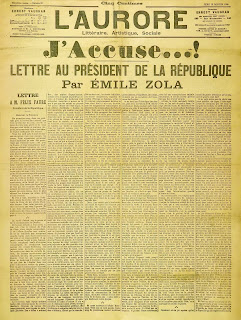 « J’Accuse…! » est le titre d’un article rédigé par Émile Zola lors de l’affaire Dreyfus. Il est publié dans le journal L’Aurore du 13 janvier 1898 sous la forme d’une lettre ouverte au Président de la République française Félix Faure. Au travers d’un véritable pamphlet accusateur, la contestation d’une décision de justice au nom de valeurs universelles, l’écrivain décide de s’exposer publiquement, afin de comparaître aux assises pour qu’un nouveau procès, plus indépendant, puisse se dérouler. C’est cet article qui relance l’affaire Dreyfus, au moment où, le véritable coupable (le commandant Esterházy) étant acquitté, tout pouvait sembler perdu pour le camp dreyfusard. Cet article représente le symbole de l’éloquence oratoire et du pouvoir de la presse mis au service d’une cause juste et généreuse.
« J’Accuse…! » est le titre d’un article rédigé par Émile Zola lors de l’affaire Dreyfus. Il est publié dans le journal L’Aurore du 13 janvier 1898 sous la forme d’une lettre ouverte au Président de la République française Félix Faure. Au travers d’un véritable pamphlet accusateur, la contestation d’une décision de justice au nom de valeurs universelles, l’écrivain décide de s’exposer publiquement, afin de comparaître aux assises pour qu’un nouveau procès, plus indépendant, puisse se dérouler. C’est cet article qui relance l’affaire Dreyfus, au moment où, le véritable coupable (le commandant Esterházy) étant acquitté, tout pouvait sembler perdu pour le camp dreyfusard. Cet article représente le symbole de l’éloquence oratoire et du pouvoir de la presse mis au service d’une cause juste et généreuse.
>早尾 貴紀
>
>Association for Civil Rights in Israel
>
>Ligue des droits de l’Homme
>
>Георгий Полтавченко
>
>Anna Nemtsova
>Jake Adelstein
>
>Noam Chomsky
>
>Level 3 of Tepido.org
>
The Universal Declaration of Human Rights
All human beings are born free and equal in dignity and rights.
篠田建市
異様な時代が来たと感じている。やくざといえども、われわれもこの国の住人であり、社会の一員。。。。われわれが法を犯して取り締まられるのは構わないが、われわれにも親がいれば子供もいる、親戚もいる、幼なじみもいる。こうした人たちとお茶を飲んだり、歓談したりするというだけでも周辺者とみなされかねないというのは、やくざは人ではないということなのだろう。しかも一般市民、善良な市民として生活しているそうした人たちがわれわれと同じ枠組みで処罰されるということに異常さを感じている。。。今回の条例は法の下の平等を無視し、法を犯してなくても当局が反社会的勢力だと認定した者には制裁を科すという一種の身分政策だ。今は反社会的勢力というのは暴力団が対象だが、今後拡大解釈されていくだろう。
われわれの子供は今、みんないじめにあい、差別の対象になっている。われわれに人権がないといわれているのは知っているが、家族は別ではないか。若い者たちの各家庭では子供たちが学校でいじめにあっていると聞いているが、子を持つ親としてふびんに思う。このままでは将来的に第2の同和問題になると思っている。
懲役とは隣り合わせだし、ときには生命の危険もある。それでも人が集まってくる。昔から言われることだが、この世界で救われる者がいるからだと思う。山口組には家庭環境に恵まれず、いわゆる落ちこぼれが多く、在日韓国、朝鮮人や被差別部落出身者も少なくない。こうした者に社会は冷たく、差別もなくなっていない。心構えがしっかりしていればやくざにならないというのは正論だが、残念ながら人は必ずしも強くはない。こうした者たちが寄り添い合うのはどこの国でも同じだ。それはどこかに理由がある。社会から落ちこぼれた若者たちが無軌道になって、かたぎに迷惑をかけないように目を光らせることもわれわれの務めだと思っている。
>Marius Arnesen
>Daily Yonder
>Salon
>Le Télégramme
>Garet Garrett
>
>Khodorkovsky and Lebedev Communications Center
>
>Прессцентр Михаила Ходорковского и Платона Лебедева
>
>Stop Blood Diamonds
>Stop Blood Diamonds is an organization pledged to stopping the exploitation of the diamond trade by human rights abusers.
Blood diamonds, often called conflict diamonds, are mined in war torn African countries by rebels to fund their conflict. The rebels grossly abuse human rights, often murdering and enslaving the local populations to mine the diamonds.
We can stop this by purchasing legitimate diamonds. Botswana used to be a poor farm country but today its government works hand in hand with the Diamond industry to give Botswana a living standard 7 times higher than its neighbors.
Make sure your jeweler stops the blood diamonds trade by supporting conflict free diamonds.
>Kyung-wha Kang
>
>Nathan Bransford
>
>Насер Абдель Азиз ан-Насер
>G. John Ikenberry
>Gita Sen, Piroska Östlin, Gita Sen, Piroska Östlin, Asha George
>
Noam Chomsky
(“the first 9/11”) … September 11, 1973, when the US succeeded in its intensive efforts to overthrow the democratic government of Salvador Allende in Chile with a military coup that placed General Pinochet’s brutal regime in office. The goal, in the words of the Nixon administration, was to kill the “virus” that might encourage all those “foreigners [who] are out to screw us” to take over their own resources and in other ways to pursue an intolerable policy of independent development. In the background was the conclusion of the National Security Council that, if the US could not control Latin America, it could not expect “to achieve a successful order elsewhere in the world”.
The first 9/11, unlike the second, did not change the world. It was “nothing of very great consequence”, as Henry Kissinger assured his boss a few days later.
These events of little consequence were not limited to the military coup that destroyed Chilean democracy and set in motion the horror story that followed. The first 9/11 was just one act in a drama which began in 1962, when John F Kennedy shifted the mission of the Latin American military from “hemispheric defense” – an anachronistic holdover from World War II – to “internal security”, a concept with a chilling interpretation in US-dominated Latin American circles.
David Zirin
… only in a world so upside down could “the Beautiful Game” be run by an organisation as corrupt as FIFA and by a man as rotten to the core as FIFA President Sepp Blatter. Only Sepp Blatter, whose reputation for degeneracy approaches legend, would hire a war criminal like Henry Kissinger to head “a committee of wise persons” aimed at “rooting out corruption” in his organisation. And only these two twinning avatars of amorality would use “the Beautiful Game” as an instrument of Islamaphobia.
—
Those who bleat that “sports and politics” should be kept separate when an athlete dares express an opinion, should turn their outrage toward Blatter, Kissinger, and FIFA’s decision to see soccer as a tool to sideline Muslim women. We should call upon FIFA to revoke the forfeits and adhere to the three words that should bind all leagues, all countries, and all people who believe that sports can reflect the best of our species: Let them play.
>Reuters
>Manning Marable
>Socialism lost its way largely when it became decoupled from the processes of democracy. My vision of a socially just society is one that is deeply democratic, that allows people’s voices to be heard, where people actually govern. C.L.R James sometimes used the slogan “every cook can govern” to speak to the concept that there should be no hierarchies of power between those who lead and their constituencies. This idea is related to Antonio Gramsci’s argument that the goal of the revolutionary party is for every member to be an intellectual. That is, everyone has the capacity, has the ability to articulate a vision of reality and to fight for the realization of their values and goals in society. Gramsci is pointing toward the development of a strategy that is deeply democratic, one where we don’t have elitist, vanguardist notions of what society should look like, but have humility and the patience to listen to and learn from working class and poor people, who really are at the center of what any society is.
>Marshall
>
S.E. Smith
Human rights are a set of basic rights which many people believe belong to all humans by birthright. The concept is ancient, although the term “human rights” only entered usage in the 1940s. Because many people, especially in the West, feel very strongly about human rights, a number of measures have been undertaken to protect them. An international organization, the United Nations, has a large division related to the protection of human rights.
—
In the 1940s, the Second World War called a great deal of attention to the concept. Many nations were deeply concerned by the actions of the Axis Powers, which greatly abridged human rights for a number of people, most prominently followers of the Jewish faith. At the close of the war, the United Nations was founded, and human rights became one of the major issues that the organization focused on. By 1948, the United Nations had issued a Universal Declaration of Human Rights, asking all member nations to sign it and defend the rights described therein.
>Ryan Lizza
>
>Paula J. Dobriansky, Thomas Carothers
>
>Curt Tarnoff
>
>Susan B. Epstein, Nina M. Serafino, and Francis T. Miko
>
>Why Democracy?
>Democracy is arguably the greatest political buzzword of our time and is invoked by everyone – but what does it mean? Can it be defined, measured, safeguarded? Can it be sold, bought, and transplanted? Can it grow? Can it die? What does it mean to people who can’t even talk about it? What does it mean to people who don’t believe in it? What does it mean to you?
>Noam Chomsky
>
>위키백과
>민주주의는 의사 결정시 시민권을 가진 모두 또는 대다수에게 열려 있는 선거 또는 국민 정책투표 등의 방법을 통하여 전체적인 구성원의 의사를 반영, 실현시키는 사상 및 정치 사회체제이다. 일반적으로 국민 개개인이 나라의 주인된 힘, 즉 주권을 행사하는 이념과 체제’라고도 표현된다. ‘민주주의’는 근대사회에서 서구의 자유민주주의나 사회민주주의와 동의어처럼 사용되었으나 “반자유주의적 민주주의” 국가도 분명 존재하고 있다. 이런 맥락 속에서 ‘자유주의적’이라는 수식어는 엄밀히 말하면 입헌주의적 자유주의와 각인의 평등한 인권의 보장을 지칭한다. 그러나 민주주의는 다른 견해를 기술하는 데에도 널리 사용된다. 어느 경우에든, 민주주의의 이념이 민주사회에서 사회와 정치 문화에 대한 합리적 견해들을 포괄하는 것으로 의미가 무한정 확장될 수 있다.한편,민주주의에 대한 가장 간결한 정의로 링컨의 “인민의,인민에 의한,인민을 위한 정치”가 통용되고 있다.이는 민주주의의 핵심요소로 국민주권과 시민자치,복지주의를 담고 있다.
>Mark Stivers
>Томас Джефферсон
>
>infousa.ru
>
>Ole Christian Madsen, Lars K. Andersen
>Richard Madsen
>
Amartya Sen
Cultural differences and value differences between Asia and the West were stressed by several official delegations at the World Conference on Human Rights in Vienna in 1993. The foreign minister of Singapore warned that “universal recognition of the ideal of human rights can be harmful if universalism is used to deny or mask the reality of diversity.” The Chinese delegation played a leading role in emphasizing the regional differences, and in making sure that the prescriptive framework adopted in the declarations made room for regional diversity. The Chinese foreign minister even put on record the proposition, apparently applicable in China and elsewhere, that “Individuals must put the states’ rights before their own.”
I want to examine the thesis that Asian values are less supportive of freedom and more concerned with order and discipline, and that the claims of human rights in the areas of political and civil liberties, therefore, are less relevant and less appropriate in Asia than in the West.
>James Fitzjames Stephen
>Parliamentary government is simply a mild and disguised form of compulsion. We agree to try strength by counting heads instead of breaking heads, but the principle is exactly the same… The minority gives way not because it is convinced that it is wrong, but because it is convinced that it is a minority.
The criminal law stands to the passion of revenge in much the same relation as marriage to the sexual appetite.
>Gene Sharp
>
>Bret Fisk
>
>Omar Ashour
>
>大杉栄
>
>dnoakes
>Ari Karpel
>
>Colum Lynch
>
U.N. Secretary-General Ban Ki-moon traveled to Hollywood last year to cajole filmmakers and movie stars into making pictures that portray the U.N.’s good works. The Whistleblower, a scathing full-length account of the U.N. peacekeeping effort in Bosnia during the late 1990s, is not what he had in mind.
The Samuel Goldwyn Films movie, which is due out in theaters in Los Angeles and New York on Aug. 5, stars British actress Rachel Weisz as a U.N. policewoman who stumbles into the sordid world of Balkan sex trafficking and finds her fellow U.N. peacekeepers implicated in the trade.
It constitutes perhaps the darkest cinematic portrayal of a U.N. operation ever on the big screen, finding particular fault with top U.N. brass, the U.S. State Department, and a major U.S. contractor that supplies American policemen for U.N. missions.
The actual abuses in Bosnia were so shocking that the film’s director, Larysa Kondracki, told Turtle Bay that she had to tone it down to make it believable and to ensure that viewers didn’t “tune it out.” The movie, she said, in some ways resembles a “70s paranoid thriller” in which it can be hard to tell the difference between the heroes and the villains. Kondracki declined to name DynCorp as the model for the company portrayed in the movie, citing unspecified legal concerns.
>Marc Lynch
>
- Engage newly empowered publics. The administration should lay out a vision that aligns the United States with the aspirations of publics in the Arab world and Iran, and demonstrate that commitment in practice.
- Focus on human rights and universal freedoms. The United States should call for the same universal rights and freedoms in Iran that it has articulated for the rest of the region, and significantly increase its focus on human rights in its approach to Tehran.
- Communicate Iran’s weakness. The administration should launch a strategic communications campaign designed to highlight Iran’s irrelevance to the uprisings and dwindling soft power, and avoid the temptation to embrace narratives that give Tehran an undeserved centrality in the region’s transformation.
- Use diplomacy to shape the future. A negotiated solution to the Iranian nuclear challenge is unlikely in the short term, and this is not the time for a new public initiative. However, the administration should continue pursuing lower-level diplomacy and confidence-building measures designed to create possibilities for movement when conditions change.
- Watch out for war. The administration should guard against sudden spirals to war based on miscalculations, fear and unpredictable proxy struggles. It should reject efforts to adopt the model of intervention applied in Libya to Iran, and continue to resist calls for military action.
>Wikia
>Naqshbandi-Haqqani Sufi Order of America
>English Bill of Rights
>United States Bill of Rights
>United States Declaration of Independence
>
>Jean Jacques François Le Barbier
>Fareed Zakaria
>
>Why Democracy?
>
Democracy is arguably the greatest political buzzword of our time and is invoked by everyone – but what does it mean? Can it be defined, measured, safeguarded? Can it be sold, bought, and transplanted? Can it grow? Can it die? What does it mean to people who can’t even talk about it? What does it mean to people who don’t believe in it? What does it mean to you?
With so much violence done in the name of democracy, it has undoubtedly become a more contested idea. However, there is even greater need than before to understand it better and, despite its ironies, there is an unparalled interest in the promise it holds.
>王晨
>
>Embassy Beijing
>
>Mahatma Gandhi
>
>UNHCR
>
>Frederic Bastiat
>When goods cannot cross borders, armies will.
>John R. Oneal, Bruce M. Russett
>
>U.S. Department of State
>Democracy and respect for human rights have long been central components of U.S. foreign policy. Supporting democracy not only promotes such fundamental American values as religious freedom and worker rights, but also helps create a more secure, stable, and prosperous global arena in which the United States can advance its national interests. In addition, democracy is the one national interest that helps to secure all the others. Democratically governed nations are more likely to secure the peace, deter aggression, expand open markets, promote economic development, protect American citizens, combat international terrorism and crime, uphold human and worker rights, avoid humanitarian crises and refugee flows, improve the global environment, and protect human health.
With these goals in mind, the United States seeks to:
- Promote democracy as a means to achieve security, stability, and prosperity for the entire world;
- Assist newly formed democracies in implementing democratic principles;
- Assist democracy advocates around the world to establish vibrant democracies in their own countries; and
- Identify and denounce regimes that deny their citizens the right to choose their leaders in elections that are free, fair, and transparent.
>Democracy Now!
>
>Aryeh Neier
>
National Security Strategy of the United States of America
We will speak out honestly about violations of the non-negotiable demands of human dignity, using our voice and vote in international institutions to advance freedom; use our foreign aid to promote freedom and support those who have struggled nonviolently for it, ensuring that nations moving towards democracy are rewarded for the steps they take; make freedom and the development of democratic institutions key themes in our bilateral relations, seeking solidarity and cooperation from other democracies while we press governments that deny human rights to move to a better future; take special efforts to promote freedom of religion and conscience, and defend it from encroachments by repressive governments. We will champion the cause of human dignity and oppose those who resist it.
>Richard Ashby Wilson
>
>Alexis de Tocqueville
>
>Paul Gready
>
>Michael Ignatieff
>
